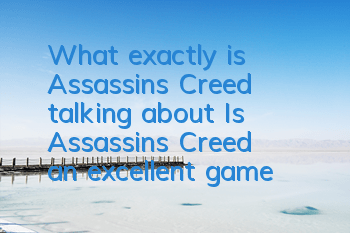I have always believed that a work can become the best game on this planet does not rely entirely on the game content itself. The game content itself can only determine the lower limit of a game, and the upper limit is the artistic attainments of this game, as is the same with Ubisoft's masterpiece "Assassin's Creed" series. Speaking of Assassin's Creed, what will happen to your mind at the first moment? Is it a exciting and gorgeous battle, a sneak that is so nervous that it makes people unable to breathe, a chic and free parkour? Or is it a highly restored charm to various ancient cities in history? Maybe different players must have different answers. But I think what impressed me the most about "Assassin's Creed" is the theme of "Freedom VS Order" that runs throughout the entire series. This issue that humans are still arguing about today is interspersed in stories that are both true and false, and around this theme, it presents us with one wonderful story after another.
1. Freedom vs Order
Why should humans pursue freedom or order? The debate on this issue has never stopped with the birth of human society. Absolute freedom will fall into chaos, and an absolute order will lead to slavery. In fact, this issue can be seen as a collision between "sacred individual rights" and "individuals must obey the collective". Of course, whether it is those who support freedom or those who support order, they have never thought that absolute freedom or absolute order is needed. What they pursue is that one of the freedom or orders dominates. As the ruled class, we always want more freedom, and the ruling class always wants more order, so this issue becomes an opposition between the ruler and the ruled. The same is true in the Assassin's Creed game, which represents freedom being chased by the assassins of the ruling class, which represents the ruling class's Templars pursue order, and constantly supports the emperors of various countries to achieve their goals.
As shown in the game, there is no obvious difference between right and wrong, good and evil in pursuit of freedom and order. It is just that Ubisoft, as a French game company, is part of a country that gave birth to Rousseau and Voltaire, which puts players on the side of the assassins who pursue freedom. Perhaps it was the centralization and even dictatorship caused by the order in history that gave the entire human race too painful memories. For example, the Nazis and the Khmer Rouge made many people no longer trust the order and turned to the embrace of freedom. The elite always have a sense of confidence, and the order and rules they create can ensure the normal operation of a country and even world peace. The civilian class always has a concern, and the elites who hold power ignore the civilians for their own selfish desires. But in many cases, some people change so quickly between pursuing freedom and pursuing order. For example, the leader who led the successful uprising of peasant people was to pursue freedom, but after he successfully became an emperor, he began to pursue order and rule the country.
Many people pursue freedom or order not by what they think deeply in their hearts, but by the establishment of their own classfield. If their class changes, what they pursue will also change due to changes in their positions.
2. Freedom and Order in Assassin's Creed
In the setting of the "Assassin's Creed" series of games, whether it is the Templar or the Assassin, they follow the "justice" deep in their hearts to pursue order or freedom, not those mentioned in the previous article who change their pursuits as their position changes. Although Ubisoft has players on the side of the assassin, not all assassins are “good people”, and not all Templars are “bad people”. For example, in "Assassin's Creed: Mutiny", the indiscriminate killing of the Templars as government officials led to the collapse of the North American order, and blindly snatching the magic weapon, causing 100,000 deaths in two major disasters; for example, Colonel Monroe, the Templars who eliminated violence and peace in "Assassin's Creed: Mutiny". So the assassin Shea betrayed the Assassin Organization. The real assassin should not just obey the organization and dogma, but follow his own beliefs to make his own judgment.
The meaning of "everything is empty, everything is acceptable" in "everything is empty" is to ask the assassins to find the truth with their own eyes. Anything may not be what you see on the surface, and don't be blinded by these superficial phenomena. "Everything is allowed" does not give the assassins real freedom, it does not mean that you can do anything to achieve your goal (such as killing 100,000 people in order to grab a magic weapon), but after finding the truth, it makes judgments and choices by being loyal to your inner beliefs. For example, after seeing the various actions of the North American Assassin organization, Shay chose to betray the organization by believing in his inner belief that "does not sacrifice innocent people, helps the poor people." When the two dogmas of "not sacrificing innocent" and "not jeopardizing brothers and alliances" conflicted, Shay followed his inner judgment and chose "not sacrificing innocent". In fact, Shay's "not sacrificing innocent" does not come from dogma, but from his own heart. In front of a real assassin, dogma appears pale because dogma is to bind freedom and not pursue freedom. Therefore, a truly qualified assassin will not stick to dogmas, but will follow inner beliefs, follow their own judgments, and follow "everything is allowed." When dogma conflicts with the inner belief and judgment of an excellent assassin, an excellent assassin should follow his own heart. Such things are allowed, and Shay's behavior is a typical "everything is allowed."
We can also find the Templar's Creed in the game:
Lead all restless souls until they embark on the path of tranquility
Lead all the agitation desires until the passionate blood cools down
Train all floating intentions to turn into stable contemplation
One of our members never hides our intentions.
If the world is already in chaos, if the people are at a loss, when people shoot bullets at their compatriots for their own desires, stabbing the blade of freedom into the hot chest. ThatIt is where our Templars appear.
May the Knights be blessed forever and defend the temple under the scorching sun.
May the Father of Cognitive Insight guide us.
From the creed of the Templars, their original intention is to protect the weak, and they are not a group that is born "evil". In the game's settings, many great men in history are also Templars. But like the assassins, many Templars betrayed dogma and deviated from their original intentions in the pursuit of ideals. Since Templars often hold great power or have great voice in a certain industry, they also betray dogma and do bad things. The bad things Templars do are often much more powerful than the bad things Assassins do, and are more intuitive, so they make people feel more "evil" in the game.
No matter whether it is the Templar or the Assassin, neither represents justice, nor does anyone represent evil. Justice can only be represented when the "justice" they understand overlaps with the justice of universal values. Both sides have noble heroes and inferior scum. There must be the noblest Templars and the despicable assassin. Both sides use their own ways to achieve their ideals, but the conflicts broke out between the two sides made neither side unable to achieve their goals. Instead, it led to the disappearance of many innocent lives in the thousands of years of continuous struggle. Such a situation must be a contradiction that neither party wants to see but cannot be avoided. If no side will win completely, then such a struggle will last forever and there will always be innocent life sacrifices. Is this really reasonable?
3. What Ubisoft wants to tell us
Whether it is to kill freedom with absolute order or ignore order with absolute freedom, it is not the right way. The Templars and Assassins may be at the extreme, and neither of them is right. But in the game, it is precisely because both sides go to extremes that a balance is created. The balance does not tilt to either side, and the whole world has been in such a balance for thousands of years. Perhaps this is exactly what Ubisoft wants to tell us - balance is the only truth, and leaning towards either side is not correct. The Templars and Assassins may not realize that it was they who had been fighting and killing for thousands of years, and that no one had defeated each other, which brought the world into a balance, making the world not turn to absolute order or absolute freedom.
This may be the artistic attainment of the Assassin's Creed series. It is precisely because of the birth of two extremes, and a balance is born between the mutual constraints of these two extremes. If any of them is missing, it will be a disaster for the world. What would they do if all the Templars and Assassins realized this?









